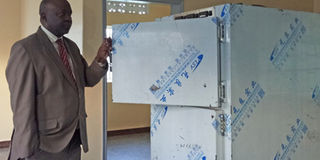Hospital sets fees for mortuary fridges

On duty. The director of Masaka Regional Referral Hospital, Dr Nathan Onyachi, inspects some of the mortuary fridges on Tuesday. The hospital has set fees for mortuary fridge services. PHOTO BY WILSON
What you need to know:
- Masaka Regional Referral Hospital serves eight districts of Masaka, Rakai, Lyantonde, Lwengo, Ssembabule, Bukomansimbi, Kalungu, and Kalangala, providing medical treatment to more than two million people.
The management at Masaka Regional Referral Hospital has come up with fees for mortuary fridge services.
In April, government delivered six mortuary fridges to the hospital to prevent dead bodies from rotting.
The fridges can accommodate up to 18 corpses at a time.
Dr Nathan Onyachi, the director of Masaka Regional Referral Hospital, said they will charge Shs50,000 per night for a body of a person who dies from the hospital wards and Shs100,000 for those who die from outside the facility.
“We would have made this service [mortuary fridge service] free, but we have to meet the costs of electricity and water,” he said on Tuesday.
Last year, the hospital adopted a pre-paid electricity billing system. Dr Onyachi said the service now requires timely payments in order to maintain regular power supply at the facility.
He, however, declined to reveal how much money they spend on both electricity and water bills every month.
Many public hospitals across the country have been switched to prepaid electricity billing system to avoid overshooting electricity budgets.
Masaka Regional Referral Hospital, which has been in existence for 92 years, has been lacking its own mortuary and relied on a structure owned by Masaka Municipality.
But last weekend, the hospital management officially unveiled its new mortuary facility.
Dr Onyachi said the structure that houses the mortuary fridges has been refurbished at a tune of Shs30m.
“We receive between three to five unclaimed bodies per day besides patients who die from the facility and I am sure the fridges can accommodate all the bodies,” he said.
But Mr Swaibu Makumba, a local social critic, faulted the management for charging money on mortuary services, insisting that being a government facility, such services should be free of charge.
“Our people are overburdened, sometimes they are charged money on X-ray services which are for free. If someone loses a relative, why do you go ahead to ask him money? That is a bad idea and we are going to oppose it,” he said.
Background
Masaka Regional Referral Hospital, which was established in 1927, was elevated to a referral level in 1995 to offer services to the greater-southern-region districts. Since then, the hospital management has been grappling with many challenges ranging from lack of space to accommodate the overwhelming numbers of patients, inadequate drugs to irregular power supply.
To address the problem of space, the Japanese government, a few years ago, constructed a multi-billion building.
The hospital also received funding from the Pakistani University of Lahore to build a diagnostic and imaging centre, which will offer services such as dental care and treatment, artificial teeth manufacturing and cardiac services.
The construction of the four-storeyed diagnostic centre is nearing completion and a medical college of Equator University of Science and Technology, which will use the hospital as a teaching facility, is yet to commence.
A maternity complex estimated to have costed Shs10.6 billion is also near completion.
The facility will have a gynaecology unit, antenatal and neonatal centres, labour and post-natal wards. It will also have a paediatric and nutrition unit and an adolescent health unit, all fully equipped with modern equipments.
Service delivery
Masaka Regional Referral Hospital serves eight districts of Masaka, Rakai, Lyantonde, Lwengo, Ssembabule, Bukomansimbi, Kalungu, and Kalangala, providing medical treatment to more than two million people.
Consequently, the hospital’s average daily contact with patients is about 2,000.



